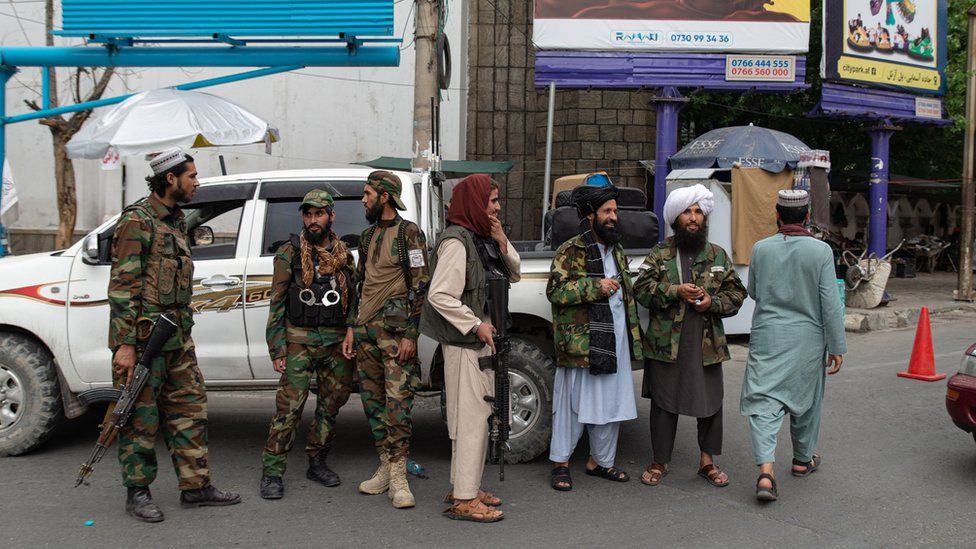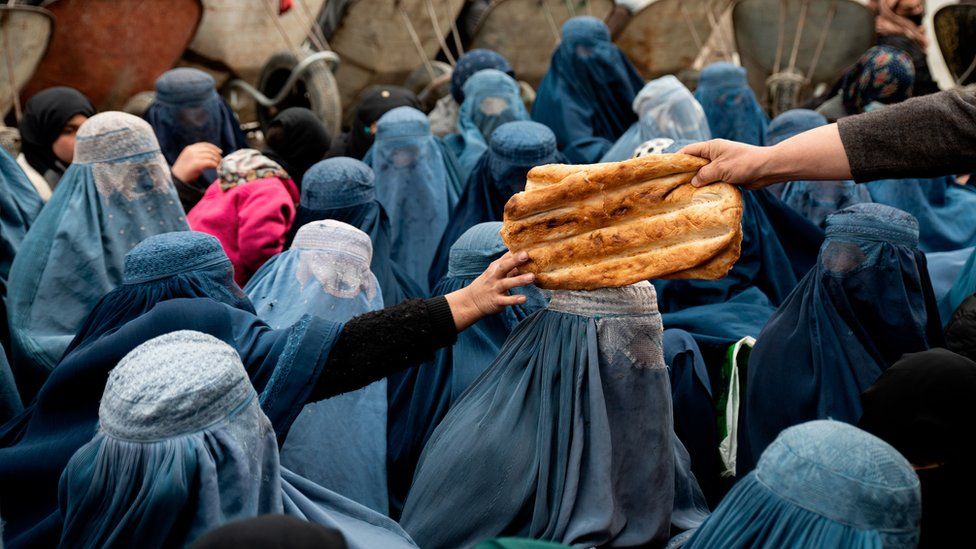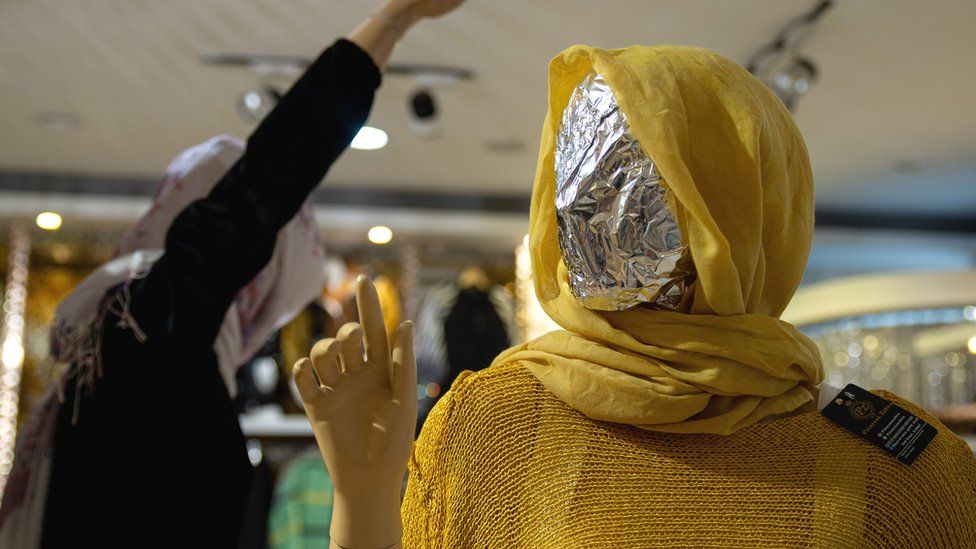Whether world leaders should engage with the Taliban government is complicated, writes Lyse Doucet.

Two years since the Taliban swept into power in Afghanistan, not a single country has formally recognised their rule.
Even engaging with the Taliban government remains deeply controversial. Some say talking with them will help bring about change, others insist the Taliban will never change so there’s no point in talking.
And as the world struggles to decide how to deal with Afghanistan’s new rulers, women’s rights – even their beauty salons – have become frontlines in political battles.
Beautician Sakina – in a dimly lit room, curtains tightly drawn, alongside bunches of lip pencils and gleaming palettes of eye shadow – reflects on why she feels women like her have become a bargaining chip.
“The Taliban are putting pressure on women because they want to push the international community to recognise their rule,” she says in her new secret salon in Kabul.
She was forced underground two weeks ago after the government ordered all women’s beauty parlours to shut. It is the latest in a seemingly endless raft of decrees restricting the lives and liberties of Afghan women and girls.
Sakina is uncertain what approach to the Taliban will work.
“If the Taliban are accepted as the government, they might remove restrictions on us, or they could impose even more,” she says, with the kind of uncertainty and anxiety that plagues this huge, sensitive political issue.
The Taliban insist issues like women’s rights are none of the world’s business.
“Focusing on this one issue is just an excuse” says Zabihullah Mujahid, spokesman for the Taliban.
Speaking to the BBC from the Afghan city of Kandahar – home to the Taliban’s supreme leader Haibatullah Akhundzada – he insists that “the current government should have been recognised long ago. We have made progress in some areas and we will also sort this issue.”
Whether to talk or not to the Taliban government sharply splits many communities with a stake in Afghanistan’s future.
This includes a deeply embittered and still shaken Afghan diaspora, forced to flee their own country when the Taliban swept into power – for a second time – on 15 August 2021.
“Saying don’t talk is easy,” says Fatima Gailani, one of four women who were on the Afghan team that tried to negotiate with the Taliban right up to the moment they seized power.
“If you don’t talk, then what do you do?”
Since the collapse of the last government, she’s been involved in backchannel initiatives.
“We don’t need another war”, she emphasises, in a nod to voices, including former military commanders and old warlords, who still harbour hopes of eventually toppling the current order by force.

Others in the diaspora are calling for greater pressure, including more sanctions and additional travel bans, to intensify the isolation.
“What is the point of engagement?” demands Zahra Nader, editor-in-chief and founder of Zan Times, a women-led newsroom in exile. “They have shown who they are and what kind of society they want to build.”
Diplomats involved in dialogue emphasise that engagement is not recognition, and concede there is little to show so far.
But signs of dissatisfaction, even among senior Taliban leaders, with the most extreme edicts imposed by the ageing ultra-conservative supreme leader, keep kindling faint hope.
“If we don’t engage Afghans who want to engage, in the smartest possible way, we’ll give free reign to those who want to keep a large part of the population essentially imprisoned,” says a Western diplomat involved in recent meetings with mid-level Taliban representatives.
Sources point to a recent unprecedented meeting between the reclusive Akhundzada with Qatar’s Prime Minister Mohammed bin Abdulrahman Al Thani – the supreme leader’s first with a foreign official. Diplomats briefed on the discussions say they confirmed wide gaps, especially when it comes to education and women’s rights, but also indicated a possibility to find a way forward, however slowly.
Discussions are tough – it’s hard to find common ground.
“There’s a lot of distrust, even disdain, between sides who fought each other for years,” says Kate Clark of the Afghanistan Analysts Network. “The Taliban think the West still wants to corrupt their nation and the West doesn’t like the Taliban policy on women’s rights and their authoritarian rule.”
Ms Clark highlights a fundamental disconnect: “The West may see issues like recognition as concessions, but the Taliban see it as their right, a God-given right to rule after they defeated the US superpower and returned to power, for a second time.”
Outside powers balance criticism with praise for progress, such as a crackdown on corruption which boosted revenue collection, and some efforts to tackle security threats posed by the Islamic State group. And Western powers look to Islamic countries and scholars to take the lead on shared concerns over the Taliban’s extreme interpretations of Islam.
But there is also a toughening of tactics.
Even the UN now speaks of “gender apartheid” as the Taliban tighten the vice around women by even banning them from public parks, women’s gyms and beauty parlours. Moves are now underway to develop a legal case for “crimes against humanity”.

Despite some mixed messaging and occasional friction between regional and Western countries, so far there’s a rare meeting of minds among world powers, including Russia and China on some red lines, including recognition.
The impasse has devastating consequences for ordinary Afghans.
The UN’s latest report highlights, in bold letters, that their humanitarian appeal is only a quarter funded as of the end of July, as donors turn away. More and more Afghans are going to bed hungry.
Some 84% of households are now borrowing money just to buy food, the UN says.
And there is concern too that the footprint of Islamist groups like Islamic State is growing.
The Taliban government paints a rosy picture. And, even without recognition, their envoys – in signature traditional turbans and tunics – are among the world’s most frequent flyers, jetting to meetings in many capitals.
The acting Foreign Minister Amir Khan Muttaqi receives delegations in Kabul almost daily, with all the usual protocol, including flags and official photographs set in elegant rooms.
Western embassies in Kabul remain shuttered, except for a small European Union and a Japanese mission. Discussion goes on about whether diplomats now based in the Gulf state of Qatar should at least be in Kabul if they want to exercise any influence at all.
There’s no appetite, in any of the world’s capitals, for another bloody chapter in this 40-year war.
And despite any discord among Taliban leaders, their unity remains a goal which matters above all else.
There are no quick or easy solutions.
“The only thing I could say from my heart is that we are really suffering,” says the beautician Sakina.
“Maybe those who are not among us don’t understand it, but it’s really painful.”